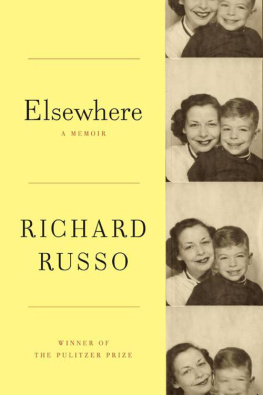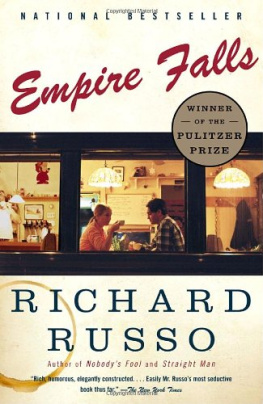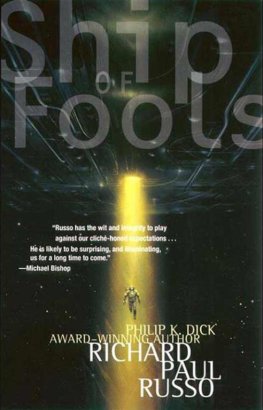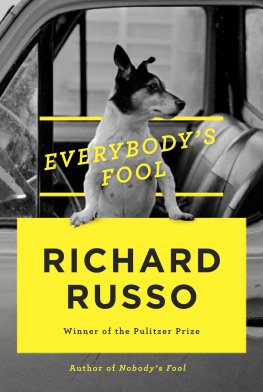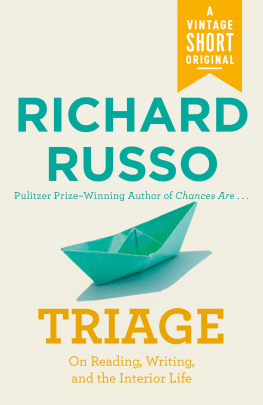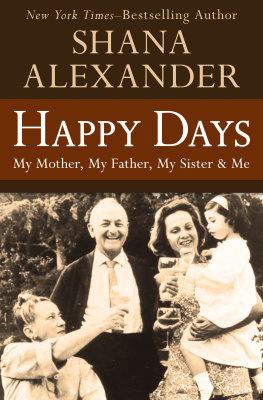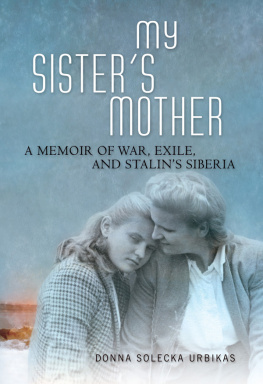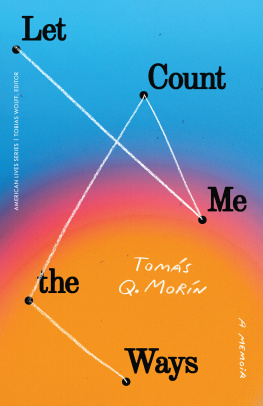
THIS IS A BORZOI BOOK
PUBLISHED BY ALFRED A. KNOPF
Copyright 2012 by Richard Russo
All rights reserved. Published in the United States by Alfred A. Knopf, a division of Random House, Inc., New York, and in Canada by Random House of Canada Limited, Toronto.
www.aaknopf.com
Knopf, Borzoi Books, and the colophon are registered trademarks of Random House, Inc.
Library of Congress Cataloging-in-Publication Data
Russo, Richard, date.
Elsewhere / by Richard Russo. 1st ed.
p. cm.
eISBN: 978-0-307-95954-6
This is a Borzoi book.
1. Russo, Richard, 1949Family. 2. Russo, Richard, 1949Childhood and youth. 3. Novelists, AmericanBiography. 4. Gloversville (N.Y.)Biography. I. Title.
PS3568.U812Z46 2012
813.54dc23
[B] 2012016354
Cover photograph courtesy of the author
Cover design by Jason Booher
v3.1
For Greg
Contents
Prologue
A few years ago, passing the sign on the New York State Thruway for the Central Leatherstocking Region, a friend of mine misread it as saying laughingstock and thought, That must be where Russos from. She was right. Im from Gloversville, just a few miles north in the foothills of the Adirondacks, a place thats easy to joke about unless you live there, as some of my family still do.
The town wasnt always a joke. In its heyday, nine out of ten dress gloves in the United States were manufactured there. By the end of the nineteenth century, craftsmen from all over Europe had flocked in, for decades producing gloves on a par with the finest made anywhere in the world. Back then glove-cutting was governed by a guild, and you typically apprenticed, as my maternal grandfather did, for two or three years. The primary tools of a trained glove-cutters trade were his eye, his experience of animal skins, and his imagination. It was my grandfather who gave me my first lessons in artthough I doubt he wouldve worded it like thatwhen he explained the challenge of making something truly fine and beautiful from an imperfect hide. After theyre tanned but before they go to the cutter, skins are rolled and brushed and finished to ensure smooth uniformity, but inevitably they retain some of natures imperfections. The true craftsman, he gave me to understand, works around these flaws or figures out how to incorporate them into the gloves natural folds or stitching. Each skin posed problems whose resolution required creativity. The glove-cutters job wasnt just to get as many gloves as possible out of a hide but to do so while minimizing its flaws.
Leather had been tanned in Fulton County, using the bark of hemlock trees, since before the American Revolution. Gloversville and neighboring Johnstown were home not only to gloves but to all things leather: shoes and coats and handbags and upholstery. My paternal grandfather, from Salerno, Italy, having heard about this place where so many artisans had gathered, journeyed to upstate New York in hopes of making a living there as a shoemaker. From New York City he took the train north to Albany, then west as far as the Barge Canal hamlet of Fonda, where he followed the freight tracks north up to Johnstown, where I was born decades later. Did he have any real idea of where he was headed, or what his new life would be like? You tell me. Among the few material possessions he brought with him from the old country was an opera cape.
Both men had wretched timing. My fathers father soon learned that Fulton County wasnt Manhattan or even Salerno, and that few men in his new home would buy expensive custom-made shoes instead of cheaper machine-made ones, so he had little choice but to become a shoe repairman. And by the time my mothers father arrived in Gloversville from Vermont, the real craft of glove-cutting was already under assault. By the end of World War I, many gloves were being pattern cut. (For a size 6 glove, a size 6 pattern was affixed to the skin and cut around with shears.) Once he returned from World War II, the process was largely mechanized by clicker-cutting machines that quickly stamped out presized gloves, requiring the operator only to position the tanned skin under the machines lethal blades and pull down on its mechanical arm. I was born in 1949, by which time there wasnt much demand for handmade gloves or shoes, but both my grandfathers had long since made their big moves to Fulton County and staked their dubious claims. By then they had families, and so there they remained. It was also during the first half of the twentieth century that chrome tanning, a chemical procedure that made leather more supple and water resistant, and dramatically sped up the whole process, became the industry standard, replacing traditional vegetable tanning and making tanneries even more hazardous, not just for workers but also for those who lived nearby and, especially, downstream. Speed, efficiency, and technology had trumped art and craft, not to mention public safety.
That said, between 1890 and 1950 people in Gloversville made good money, some of them a lot of it. Drive along Kingsboro Avenue, which parallels Main Street, and have a gander at the fine old houses set back from the street and well apart from one another, and youll get a sense of the prosperity that at least the fortunate ones enjoyed until World War II. Even downtown Gloversville, which by the 1970s had become a Dresden-like ruin, still shows signs of that wealth. The Andrew Carnegie Gloversville Free Library is as lovely as can be, and the old high school, which sits atop a gentle hill, bespeaks a community that believed both in itself and that good times would not be fleeting. On its sloping lawn stands a statue of Lucius Nathan Littauer, one of the richest men in the county, whose extended arm appears to point at the grand marble edifice of the nearby Eccentric Club, which refused him membership because he was a Jew. Down the street is the recently restored Glove Theatre, where I spent just about every Saturday afternoon of my adolescence. There was also a charming old hotel, the Kingsboro, in whose elegant dining room Monsignor Kreugler, whom Id served as an altar boy at Sacred Heart Church, held weekly court after his last Sunday Mass. Once it was razed, visitors had to stay in nearby Johnstown, out on the arterial highway that was supposed to breathe new life into Gloversville but instead, all too predictably, allowed people to race by, without stopping or even slowing down, en route to Saratoga, Lake George, or Montreal.
How quickly it all happened. In the Fifties, on a Saturday afternoon, the streets downtown would be gridlocked with cars honking hellos at pedestrians. The sidewalks were so jammed with shoppers that, as a boy trapped among taller adults, I had to depend on my mother, herself no giant, to navigate us from one store to the next or, more harrowingly, across Main Street. Often, when we finished what we called our weekly errands, my mother and I would stop in at Pedricks. Located next to city hall, it was a dark, cool place, the only establishment of my youth that was air-conditioned, with a long, thin wall whose service window allowed sodas and cocktails to be passed from the often raucous bar into the more respectable restaurant. Back then Pedricks was always mobbed, even in the middle of a Saturday afternoon. Mounted on the wall of each booth was a minijukebox whose movable mechanical pages were full of song listings. Selections made herefive for a quarter, if memory serveswere played on the real jukebox on the far wall. We always played a whole quarters worth while nursing sodas served so cold they made my teeth hurt. Sometimes, though, the music was drowned out by rowdy male laughter from the bar, where the wall-mounted television was tuned to a Yankees ball game, and if anybody hit a home run everyone in the restaurant knew it immediately. I remember listening intently to all the mens voices, trying to pick out my fathers. He and my mother had separated when I was little, but he was still around town, and I always imagined him on the other side of that wall in Pedricks.
Next page
